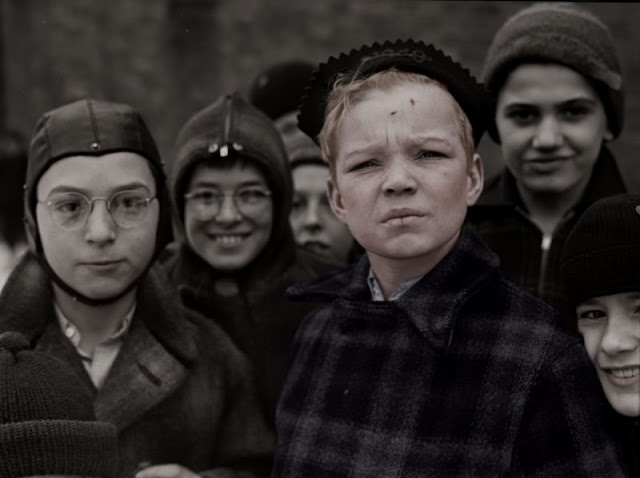Jack Delano (born Jacob Ovcharov; 1914–1997) was a Ukrainian immigrant who became an accomplished photographer for the Works Progress Administration, United Fund, and most notably, the Farm Security Administration (FSA). He wore many hats as he also was a composer known for his use of Puerto Rican folk material, started a television production company, and was a cartoonist, poet, moviemaker, professor, and architectural designer.
By the time the United States entered WWII, Delano completed a number of photo essays on industry in America preparing for the war. He was then drafted into the Air Force and served in the South Pacific from 1943 to 1946. Throughout his time in the military he continued documenting his experience via films and photographs, many of which remain classified to this day.
Delano came home a captain and was determined to move to Puerto Rico with his wife, Irene (a second cousin to fellow photographer Ben Shahn), a land both of them had fallen in love with.
Delano took amazing photos which were colorized by
Rob van den Berg that documented everyday life of the United States in the early 1940s.
 |
| Tenant farmer and part of his family in field ready for tobacco planting. Nine miles north of Danville, Pittsylvania County, Virginia, circa 1935-42 |
 |
| Children in Midland, Pennsylvania, January 1940 |
 |
| Family living in the "crackerbox" slum tenement in Beaver Falls, Pennsylvania, January 1940 |
 |
| Florida migratory farm worker, near Belcross, North Carolina, July 1940 |
 |
| Truck drivers shaving at truck service station on U.S. 1 (New York Avenue), Washington, D.C., June 1940 |
 |
| At the electric furnace in the foundry at the Farrell-Birmingham Company, Ansonia, Connecticut, November 1940 |
 |
| Children of Warren Franklin, dairy farmer near Guilford, Vermont, August 1941 |
 |
| Cleaning turpentine cups in boiling water at a still near Pembroke, Georgia, 1941 |
 |
| French village, a small settlement on Saint Thomas Island, Virgin Islands. Children of a French family living in the French village, a small settlement, December 1941 |
 |
| French-speaking women and children who live in the little colony known as the French Village, in the outskirts of Charlotte Amalie, St. Thomas, Virgin Islands, December 1941 |
 |
| In the convict camp in Greene County, Georgia, May 1941 |
 |
| Mr. Eliot H. Miller, dairy farmer at Castleton, Vermont, August 1941 |
 |
| Mrs. Carrie Ward has lived near Leraysville for seventeen years. Now she is planning to move out of the Army camp area to a small farm in Sandy Creek. Her barn is numbered for auctioning, Leraysville, New York, August 1941 |
 |
| Mrs. Leroy Dunn chopping cotton in a field, White Plains (vicinity), Georgia, May 1941 |
 |
| Mrs. Robert McWharter, wife of a tenant purchase client, Woodville, Greene County, Georgia, June 1941 |
 |
| Negro tenant farm woman. A widow. She runs the farm with the help of two children, Greene County, Georgia, 1941 |
 |
| One of the children of Warren Franklin, near Guilford, Vermont, August 1941 |
 |
| One of the girls in the "girlie" show at the Rutland Fair, Vermont, September 1941 |
 |
| Tenant farmer's wife near Penfield, Greene County, Georgia, June 1941 |
 |
| The family of Clinton J. Stewart, White Plains, Greene County, Georgia, June 1941 |
 |
| Tony Thompson, born in slavery, Greene County, Georgia, June 1941 |
 |
| Worker who lives on one of the steep streets in Charlotte Amalie, St. Thomas, Virgin Islands, December 1941 |
 |
| Newsboy selling the Chicago Defender, a leading Negro newspaper, Chicago, Illinois, April 1942 |
 |
| Welder who was employed in the roundhouse at a Chicago and Northwestern Railroad yard, Chicago, Illinois, December 1942 |
































0 comments:
Post a Comment